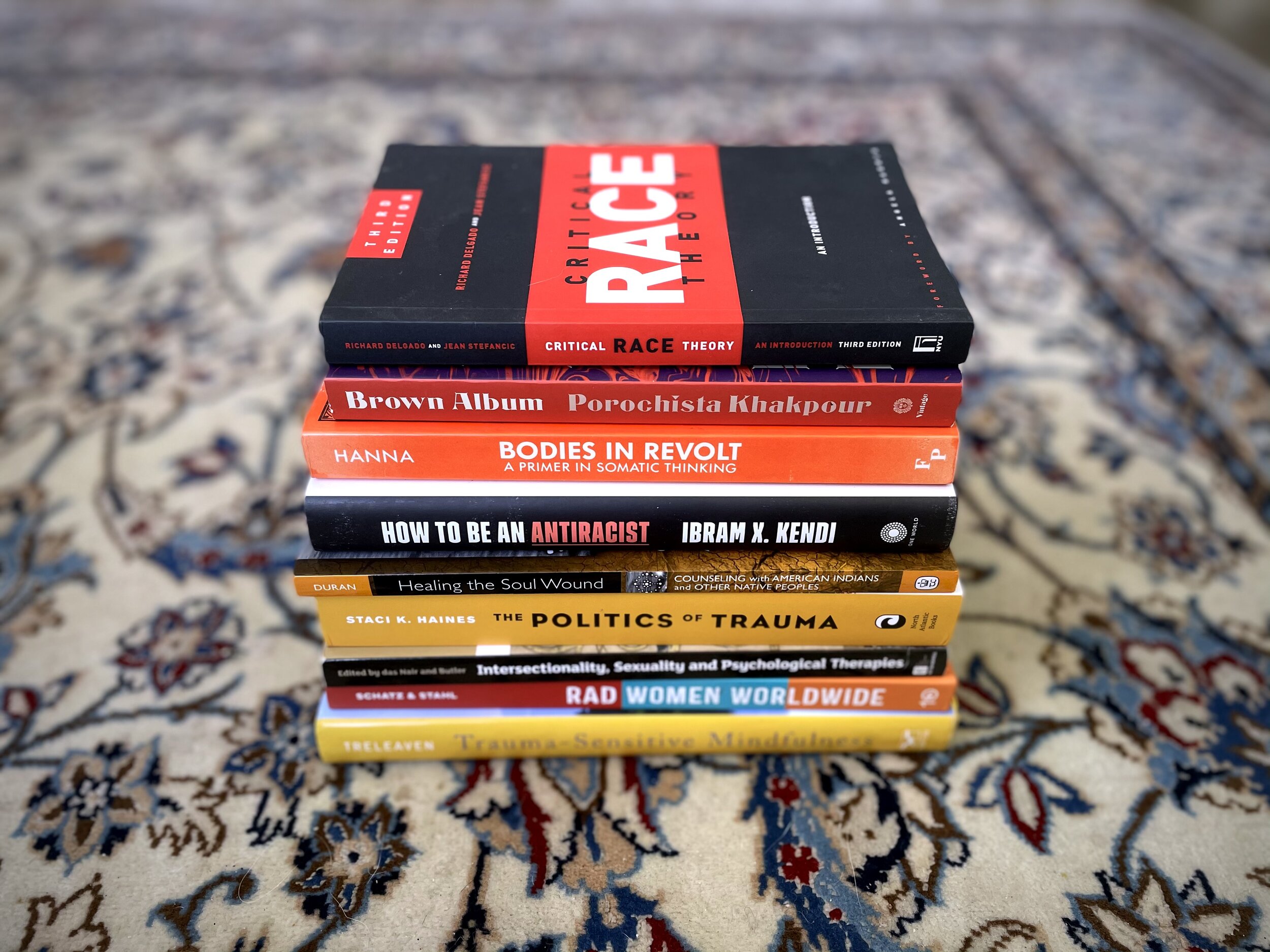
Traumas & Resiliencies of Race, Culture, History, & Ancestry
“In order to be universal, you have to be rooted in your own culture.”
— Abbas Kiarostami
Intersectional BIPOC Identities
BIPOC refers to Black, Indigenous, & POC populations. I provide therapy primarily to black and brown folx and hold BIPOC identities within an Intersectional framework that describes how our lived experience of any one aspect of our social identity is inexorable, intertwined, and interwoven with our entire constellation of social identities at intersections of race, gender, sexuality, gender expression, sexual orientation, neurodivergence, class, education level, socioeconomic status, documentation status, bodysize, and disability.
Intersectionality describes how these social identities are not merely additive but create unique gestalts that are greater than the sum of their parts. For example, the experiences of being east asian and queer are intertwined in each other, such that one experiences queerness through being east asian and experiences being east asian through queerness, thus creating a new irreducible, experiential gestalt.
Intersectionality reminds us that in our personal and ancestral stories are far more nuanced than the singular reductionistic identities of oppressed vs oppressor, that although some communities face unimaginably more oppression, that our experiences of power, privilege, and oppression are intertwined with each other and woven throughout the net of all our social identities. Intersectionality brings a rich, vivid, fine-tuned, tapestry to the telling of our personal and collective stories and experiences.
Resiliencies & Traumas of Race, Culture, History, Gender, Class, Sexual Orientation, & Ancestry
Our lives are embedded in the tapestries of culture, history, ancestry, & family. These social contexts can be sources and sites of identity, value, worth, meaning, & resiliency. These sites of cultural and social worth have been suppressed by histories of colonization. I invite into therapy an exploration of cultural and multicultural ways of healing, knowing, relating, and connecting.
This can involve an exploration of and reinterpretation of familial, cultural, intergenerational, ancestral healing practices where you get to decide what parts of your history you get to call in, embody, and tap into, and which parts you would like some boundaries around. Therapy can involve talking, movement, mindful awareness, ritual, spoken word, expressive arts, or spiritual practice.
While BIPOC cultural identities & histories are sites of resilience, beauty, art, truth, & meaning, they can also be intergenerational sites of suffering, trauma, oppression, and racism.
Trauma, traumatic stress, & PTSD do not just occur as individual responses to individual events. Many BIPOC communities have been exposed to mass event, collective, cultural, ancestral, structural, historical traumas.
Traumas that occurred in the past influence the present as they are passed down throughout generations, and have impacted the current culture. In addition, systemic trauma is also an active present, as living within the daily realities of an ableist, classist, heteronormative, patriarchal, racist, xenophobic, transphobic society is itself a form of collective trauma.
I offer trauma informed & culturally responsive somatic therapy to help you navigate collective cultural and historical traumas & connect to cultural and historical sources of resilience.
Therapy for Traumas of Race, Culture, History, & Ancestry
Exposure to war, revolution, forced relocation, state oppression, criminalization, genocide, mass incarceration, land theft, cultural erasure, racism, ethnocentrism, imperialism, state violence
Post-traumatic cultural & intergenerational growth
Lived-experiences of privilege and oppression at intersections of social identities
Complex childhood developmental trauma within cultural contexts
Self-blame, self-criticism, perfectionism, imposter syndrome, toxic relationships, shame, and feelings of cultural inferiority
Racism & Race-based traumatic stress
Micro-aggressions, othering, exotification, & stereotype threat
Pressures of taking on the role of cultural translators for family
Immigration pressures to succeed that can result in anxious perfectionism and imposter syndrome
Guilt or shame in navigating boundaries with culture and family of origin
The value and wisdom of healthy rage
Building radical rootedness in ancestral, traditional, cultural, intergenerational rituals and modes of knowing, empowering, healing, being, embodying, & connecting
Exploring internal, familial, relational dynamics of power and oppression: power to define truth or erase the truth of others, to tell one’s story or silence other stories
Experiences of suffering, stress, fear, rage, and heartache in navigating immigration experiences and separation from homeland
Navigating tensions, pushes, & pulls of social identity at intersections of race, gender, culture, immigration generation, class, or sexual orientation
Recognizing and interrupting patterns of accommodating and caretaking whiteness
Recognizing and interrupting performances of adhering to normative colonizing ways of dressing, thinking, feeling, acting, speaking, and being embodied
Patterns of adapting to oppression through hyper-vigilance, hypo-arousal, collapse, dissociation, freeze, fawning, feigning, hiding, or accommodating
Stresses, challenges, powers, and wisdom of code-switching.
Developing connection to BIPOC cultural community, wisdom, story, healing practice, resiliency, pride, and empowerment
Recovery from violence perpetuated by oppressive mental health systems
Managing stress, burnout, and exhaustion
Conscious disconnection from oppressive relational patterns
I center providing culturally affirming therapy to folks who identify as
Being of multiple cultures, ethnicities, faiths, and locales
BIPOC (Black, POC, Indigenous, Native, or First Nation)
1, 1.5, 2 Gen Immigrant, Migrant, Refugee or Diaspora populations
Spiritual, Secular, Religious experiences, identities, & communities
Multi-racial
Inter-cultural
Foster youth, adoptees, transracial adoptees
How Do I Start Therapy?
Read my Practice Policies page
Contact Me at 707 732 4525 or Nima@somatictherapynorthbay.com and schedule a 15 minute free consultation
After your initial consultation, if it seems like we’re a good fit I will email you a link to Simple Practice for electronically completed intake paperwork
If you are using insurance I will email you a link to Headway for insurance verification
Login to Simple Practice secure video portal and begin your first session or attend in person in Sebastopol
